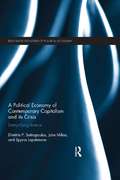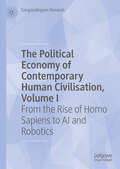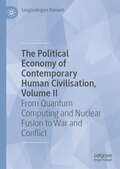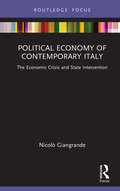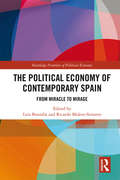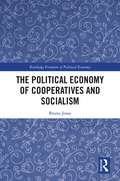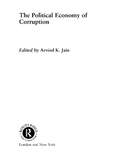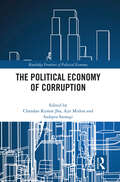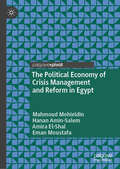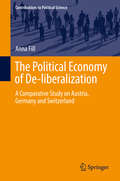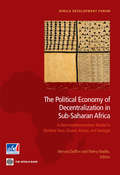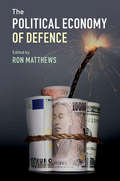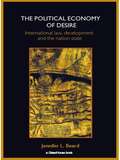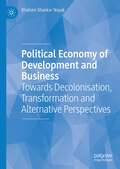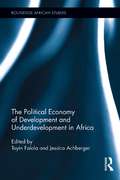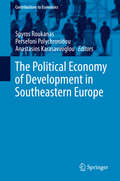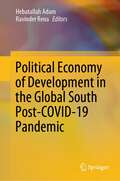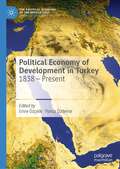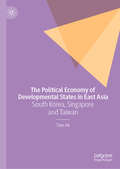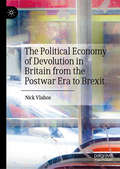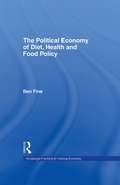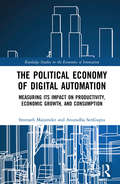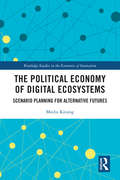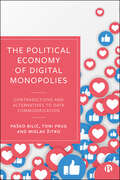- Table View
- List View
A Political Economy of Contemporary Capitalism and its Crisis: Demystifying Finance (Routledge Frontiers of Political Economy #172)
by John Milios Dimitris P Sotiropoulos Spyros LapatsiorasThe recent financial meltdown and the resulting global recession have rekindled debates regarding the nature of contemporary capitalism. This book analyses the ongoing financialization of the economy as a development within capitalism, and explores the ways in which it has changed the organization of capitalist power. The authors offer an interpretation of the role of the financial sphere which displays a striking contrast to the majority of contemporary heterodox approaches. Their interpretation stresses the crucial role of financial derivatives in the contemporary organization of capitalist power relations, arguing that the process of financialization is in fact entirely unthinkable in the absence of derivatives. The book also uses Marx’s concepts and some of the arguments developed in the framework of the historic Marxist controversies on economic crises in order to gain an insight into the modern neoliberal form of capitalism and the recent financial crisis. Employing a series of international case studies, this book will be essential reading for all those with an interest in the financial crisis, and all those seeking to comprehend the workings of capitalism.
The Political Economy of Contemporary Human Civilisation, Volume I: From the Rise of Homo Sapiens to AI and Robotics
by Sangaralingam RameshThis book, the first of two volumes, examines the evolution of humanity and development global economic systems to provide insight into the advances and challenges they have created. By placing modern technology and global crises within the context of long-term human development, it evaluates the threat of climate change on future generations by showing how past civilizations have survived and succumbed to climate events. A similar approach is taken with migration, where the current migration crisis is contrasted against historic migration patterns. The potential for artificial intelligence, quantum computing, nuclear fusion, and biotechnology to combat these challenges, as well as tackle poverty and inequality, are also discussed. This book highlights the consequences of human cognition and the constant desire for economic growth and evaluates whether they have been a net positive for human society. It will be of interest to students and researchers working on political economy and global challenges.
The Political Economy of Contemporary Human Civilisation, Volume II: From Quantum Computing and Nuclear Fusion to War and Conflict
by Sangaralingam RameshThis book, the second of two volumes, examines the evolution of humanity and development global economic systems to provide insight into the advances and challenges they have created. By placing modern technology and global crises within the context of long-term human development, it evaluates the threat of climate change on future generations by showing how past civilizations have survived and succumbed to climate events. The potential for artificial intelligence, quantum computing, nuclear fusion, and biotechnology to combat the current global challenges is explored, alongside possibilities of new technologies exacerbating poverty, inequality, and social division. This book highlights the consequences of human cognition and the constant desire for economic growth and evaluates whether they have been a net positive for human society. It will be of interest to students and researchers working on political economy and global challenges.
Political Economy of Contemporary Italy: The Economic Crisis and State Intervention (Routledge Frontiers of Political Economy)
by Nicolò GiangrandeDrawing on Kaleckian and Kaldorian approaches, Political Economy of Contemporary Italy: The Economic Crisis and State Intervention explores the reasons behind the stagnation of the Italian economy from the 1970s and suggests policy solutions to ease the crisis. The central thesis of the book is that from the early 1990s Italy experienced a constant reduction of both private and public investment which, combined with increasing labour precariousness and wage moderation, contributed to the decline of both labour productivity and economic growth. It is argued that lack of industrial policies amplified the problem of the poor macroeconomic performance, since Italian firms – small-sized and non-innovating – were incapable of staying competitive on the global scene. Net exports did not compensate for the decline of public spending, private investment and consumption. It is also shown that, in these respects, Italy presents an interesting case study with wider ramifications for it was involved in the global process of intensifying the neoliberal agenda but at a faster rate than other OECD countries. The book concludes with a call for an alternative economic policy in order to promote innovation, reduce unemployment and stimulate economic growth. This book marks a significant contribution to the literature on the recent history of the European economy, Italian studies, and the history of economic thought.
The Political Economy of Contemporary Spain: From Miracle to Mirage (Routledge Frontiers of Political Economy)
by Luis Buendía Ricardo Molero-SimarroThe so-called ‘Spanish miracle’, beginning in the mid-1990s, eventually became a nightmare for the majority of the population, culminating in the present-day economic and political crisis. This book explores the main features of the Spanish political-economic model during both the growth and crisis periods. Analyzing the causes and consequences of the continuing economic crisis in Spain, this book delves into five analytical axes: the evolution of the growth model; the role of Spain in the international division of labor; the financial sector and its influence on the rest of the economy; changes in the labor market; and the distributional consequences of both the expansive phase and the later crisis. Furthermore, contributors examine the formation of a triangle of actors (the government sector, building sector, and financial capital) that shaped the Spanish growth model, together with the effects of Spain’s membership in the Economic and Monetary Union. Also considering ecological problems, gender issues, and the immigration question, this book challenges the alleged recovery of living conditions during recent years, as well as the explanation of the crisis as the result of irrational behaviors or the greedy nature of certain actors. The Political Economy of Contemporary Spain provides a coherent explanation of the Spanish economic crisis based on a pluralistic approach, while proposing several measures that could contribute to a transformation of Spain’s economic and social models.
The Political Economy of Cooperatives and Socialism (Routledge Frontiers of Political Economy)
by Bruno JossaThis book argues that capitalism cannot be said to be truly democratic and that a system of producer cooperatives, or democratically managed enterprises, is needed to give rise to a new mode of production which is genuinely socialist and fully consistent with the ultimate rationale underlying Marx’s theoretical approach. The proposition that firms should be run by the workers on their own, was endorsed by John Dewey, the greatest social thinker of the twentieth century, but is also shared by Marxists such as Anton Pannekoek, Karl Korsch, Angelo Tasca, Antonio Gramsci and Richard Wolff. This book explores the history of this argument taking in concepts from economic and political thought including historical materialism, cooperation, utopianism and economic democracy. The book will be of significant interest to scholars and students of political economy, Marxism, socialism, history of economic thought and political theory.
The Political Economy of Corruption (Routledge Contemporary Economic Policy Issues Ser. #Vol. 2)
by Arvind K. Jain'Grand' corruption, generally used to define corruption amongst the top political elite, has drawn increasing attention from academics and policy makers during recent years. Our understanding of the causes and mechanisms of this type of corruption, however, falls short of its importance and consequences. This volume provides theoretical analysis of
The Political Economy of Corruption (Routledge Frontiers of Political Economy)
by Chandan Kumar Jha Ajit Mishra Sudipta SarangiCorruption, commonly defined as the misuse of public office for private gains, is multifaceted, multidimensional and ubiquitous. This edited collection, featuring contributions from leading scholars in the field of corruption, goes beyond the standard enforcement framework wherein individuals only compare the expected costs and benefits of a corrupt act. These chapters explore the political-cultural contexts, legal and regulatory process and, above all, moral and psychological factors in attempts to understand and explain corruption. The book explores a broad canvas where gender, technology, culture and institutional structures influence attitudes towards corruption. Design and implementation of anti-corruption strategies benefit from suitable identification of these factors contributing to the prevalence and persistence of corruption. Combining theoretical and empirical studies with evidence from experiments as well as case studies, the book provides crucial state of the art in corruption research in a highly accessible manner. This book serves as a vital reference to students and scholars in economics, politics and development studies. Additionally, policymakers and development practitioners can use the insights from this book in successful design and implementation of anti-corruption policies.
The Political Economy of Crisis Management and Reform in Egypt
by Mahmoud Mohieldin Hanan Amin-Salem Amira El-Shal Eman MoustafaThere is a significant discrepancy between the population of Egypt and the GDP of this country. This book offers pragmatic policy prescriptions for Egyptian decision-makers. It provides a path forward and toward a better future for the Egyptian people. The country faces challenges with household income, social welfare, productivity, and many other markers of twenty-first century economic success even vis-à-vis other developing country peers.This book focuses on framing the optimal macroeconomic policy agenda for Egypt in the face of the big global, regional and national forces that are being accelerated, intensified or changed by the COVID-19 crisis rather than on specific sectoral policy formulations. The authors present these big questions in the context of showing how Egypt can best navigate the risks and seize the opportunities of the current period of intense flux and transition, to put itself in the best possible position to create prosperity, stability, and hope for its citizens. The authors examine to what extent the Egyptian authorities can fulfill their ambitious development plans and in producing this work, to provide useful lessons that can be applied to other governments struggling to respond to the challenges of the age.
The Political Economy of De-liberalization: A Comparative Study On Austria, Germany And Switzerland (Contributions To Political Science Ser.)
by Anna FillThis book explores the politics behind “de-liberalization”, defined as policy reforms that constrain markets and their underlying mechanisms. By offering a comparative study on the governmental reform strategies and policy choices of Austria, Germany and Switzerland, it demonstrates that de-liberalization processes are a common reform option for governments. Utilizing a novel dataset on liberalization covering policy reform trajectories in 38 industrialized countries between 1973 and 2013, it shows that governments often draw on strategies of de-liberalization in the fields of social, welfare and labor market policy, where they can be used as compensation for the electorate in the context of liberalizing reforms. As such, the book makes an important contribution to the field of political economy by capturing the turning of the tide in scholarly and policy attention, away from liberalization and towards a re-embedding and re-regulation of economic activity.
The Political Economy of Decentralization in Sub-Saharan Africa: A New Implementation Model in Burkina Faso, Ghana, Kenya, and Senegal
by Bernard Dafflon Thierry MadièsFor the past two decades, experiments in decentralization and federalization havebeen developing in Africa, Asia, and the formerly communist states of EasternEurope. Many of the powers previously in the hands of the central governmentor its deconcentrated structures have been transferred to lower government layers. Additionally, local governments are gradually emerging as development actors. Whatever the reasons for decentralization, the transfer of new functions to localgovernments can be substantive, at least in intent. The Political Economy of Decentralization in Sub-Saharan Africa offers a newpolicy-oriented implementation model, applied systematically in parallel in BurkinaFaso, Ghana, Kenya, and Senegal. The book studies the individual countries andcompares similar issues based on the same blueprint. The analysis is not intendedto assess whether the chosen decentralization model is the right one, which doesnot exist. Rather, it examines decentralization achievements in specific nationalsettings and compares those achievements with the announced objectives. Thedivergences revealed enable decision makers to choose appropriate directionsfor country reform. This method does not transpose textbook solutions to the states. The referenceframework offers an analytical approach contextualized to each country thatintegrates not only economic arguments, but also sociopolitical ones. The authorspropose an analytical guide founded on political and institutional economy. Theyanalyze decentralized policies that help stakeholders to identify the issues, pointout stumbling blocks, and ensure coherent decisions on decentralization. The bookis an asset to all those involved in negotiating and implementing approaches todecentralization.
The Political Economy of Defence
by Ron MatthewsDefence is the ultimate public good, and it thus falls to government to determine the appropriate amount of public revenue to commit to the defence of the realm. This will depend on history, strategic threat, international security obligations, entreaties from allies and, of course, the threat faced. The Political Economy of Defence is structured to identify, explain and analyse the policy, process and problems that government faces from the starting point of national security through to the ultimate objective of securing a peaceful world. Accordingly, it provides insights into how defence budgets are determined and managed, offering relevant and refreshingly practical policy perspectives on defence finance, defence and development trade-offs, sovereignty vs globalisation debates, and many other pertinent issues. It will appeal to policymakers, analysts, graduate students and academics interested in defence economics, political economy, public economics and public policy.
The Political Economy of Democratic Transitions
by Stephan Haggard Robert R. KaufmanIn the last two decades, there has been a widespread movement from authoritarian to democratic rule among developing countries, often occurring against a backdrop of severe economic crises and the adoption of market-oriented reforms. The coincidence of these events raises long-standing questions about the relationship between economic and political change. In this book, Stephan Haggard and Robert Kaufman explore this relationship, addressing a variety of questions: What role have economic crises played in the current wave of political liberalization and democratization? Can new democracies manage the daunting political challenges posed by economic reform? Under what economic and institutional conditions is democracy most likely to be consolidated? Drawing on contemporary political economy and the experiences of twelve Latin American and Asian countries, they develop a new approach to understanding democratic transitions.
The Political Economy of Desire: International Law, Development and the Nation State
by Jennifer BeardContaining the best interdisciplinary work in international law, this book offers an intelligent and thought-provoking analysis of the genealogy of Western capitalist ‘development’. Putting forth ground-breaking arguments and challenging the traditional boundaries of thinking about the concept of development and underdevelopment, it provides readers with a new perspective on the West's relationship with the rest of the world. With Jennifer Beard’s departure from the common position that development and underdevelopment are conceptual outcomes of the Imperialist era, The Political Economy of Desire positions the genealogy of development within early Christian writings in which the Western theological concepts of sin, salvation and redemption are expounded. Drawing upon legal theory, anthropology, economics, historiography, philosophy of science, theology, feminism, cultural studies and development studies the author explores: the link between the writings of early theologians and the processes of modern identity formation – tracing the concept of development to a particularly Christian dynamic how the promise of salvation continues to influence Western ontology. An innovative and topical work, this volume is an essential read for those interested in international law and socio-legal theory.
Political Economy of Development and Business: Towards Decolonisation, Transformation and Alternative Perspectives
by Bhabani Shankar NayakThis book presents an alternative, critical perspective on the political economy of development and business. The everyday issues experienced by those on the margins are examined to highlight the Eurocentric bias at the centre of development theory, public policy, and business practices. Ruling class projects within these areas are critically evaluated in order to present a vision of development that recognises pluralistic traditions and people’s everyday experiences. Eurocentric liberal myopia and its praxis are outlined in development theory, public policy, and business practices. Particular focus is given to tribal planning, needs based development, public private partnerships, modes of capital accumulation, conscious capitalism, and creative business education. This book stands in defense of critical inquiry and pluriversal knowledge against the monolithic knowledge traditions and use of ruling class projects in development, public policy, and business ethics. It aims to explore new forms of economic transformation that are inclusive and worker led. It will be relevant to students and researchers interested in the political economy, development economics, and international business.
The Political Economy of Development and Underdevelopment in Africa (Routledge African Studies #10)
by Toyin Falola Jessica AchbergerWhile Africa is too often regarded as lying on the periphery of the global political arena, this is not the case. African nations have played an important historical role in world affairs. It is with this understanding that the authors in this volume set out upon researching and writing their chapters, making an important collective contribution to our understanding of modern Africa. Taken as a whole, the chapters represent the range of research in African development, and fully tie this development to the global political economy. African nations play significant roles in world politics, both as nations influenced by the ebbs and flows of the global economy and by the international political system, but also as actors, directly influencing politics and economics. It is only through an understanding of both the history and present place of Africa in global affairs that we can begin to assess the way forward for future development.
The Political Economy of Development in Southeastern Europe (Contributions to Economics)
by Spyros Roukanas Persefoni Polychronidou Anastasios KarasavvoglouThis book offers important new insights into recent advances and perspectives in the field of political economy of development in Southeastern European countries. In addition, it provides theoretical and empirical contributions to political economy of development in an international context. Written by authors from Greece, Serbia and Turkey, the book covers a broad spectrum of topics – from macroeconomics and economic policy to international political economy and globalization. Presenting new and original ideas, this is a valuable resource for anyone wishing to gain a deeper understanding of political economy of development in Southeastern Europe: academicians, policymakers and business practitioners.
Political Economy of Development in the Global South Post-COVID-19 Pandemic
by Hebatallah Adam Ravinder RenaThis volume brings together contributions from the academic community, policymakers, and practitioners to delve into the profound challenges facing the international system in the aftermath of the COVID-19 pandemic. With a focus on the Global South, it offers a comprehensive analysis of the political economy of development in this region, considering the economic, social, and geopolitical factors at play. The book addresses the multifaceted challenges that developing countries encounter in terms of economic growth, poverty reduction, and social development in a post-pandemic world. It examines the impact of the pandemic on these countries and explores innovative strategies for promoting economic recovery and sustainable development.It is an invaluable resource for anyone interested in understanding the political economy of development in the Global South post covid-19 pandemic. It provides a comprehensive overview of the challenges facing developing countries and offers valuable insights into the potential solutions that can be implemented to foster economic recovery and development. Its interdisciplinary approach and diverse perspectives make it a valuable resource for anyone interested in the dynamics of development in the Global South.
Political Economy of Development in Turkey: 1838 – Present (The Political Economy of the Middle East)
by Emre Özçelik Yonca ÖzdemirAdopting a political-economy perspective, this book is an original collection of research chapters that focus on Turkey’s economic-development experience from the nineteenth century to the present. It provides a systematic and chronological examination of Turkey’s major historical dynamics in the economic and socio-political spheres. The chapters are organized according to the consecutive phases of Turkey’s political-economic development. Each chapter not only reflects on the country-specific aspects of those development phases, but also clarifies the dependence of domestic-policy orientations on the dynamics of the world economy. As such, the book provides a historically-conscious, political-economic account of Turkey’s dependent-development experience. The book serves as a quality reference on the political economy of modern Turkey, bringing together fourteen prominent experts as contributing authors who have devoted their intellectual lives to the understanding and explanation of political-economic dynamics in both Turkey and the world. All contributors write on a historical period of the Turkish economy in which they are most specialized. This aspect of the book is a momentous advantage in the field of Turkey's political economy, enabling the highest degree of academic expertise to concentrate in each chapter.
The Political Economy of Developmental States in East Asia: South Korea, Singapore and Taiwan
by Tian HeThis book explores the variations in the transformation of the Asian developmental state in South Korea, Singapore, and Taiwan. Based on an original theory, the author argues that these variations are influenced by two factors: industrial structure and democratic transition, both of which are shaped by the strategic calculations of the ruling elites to maintain power. The theory concerns two concurrent political processes during the state’s development process, namely the emergence of economic interest groups with varying levels of policy constraints on the state; and the process of democratic transition driven by the rise of the middle class. The book will appeal to students and researchers in the fields of Asian politics, development studies, political economy and comparative politics.
The Political Economy of Devolution in Britain from the Postwar Era to Brexit
by Nick VlahosThis book examines the political economy of devolution in Britain from the postwar period to the present. It situates devolution in Britain within an understanding of the partisan recalibration of political, economic and democratic scales (or levels) of the state. The author utilizes various explanatory tools to unpack complex social, economic, spatial and political phenomena across national, regional and local scales. The book further contributes to our conceptual understanding of decentralization as a broader, comparative, phenomenon. Particular emphasis is placed on examining why decentralization and devolution occur at particular points in time, which enables the investigation into how political and fiscal powers are (re)organized at different levels of the state.
The Political Economy of Diet, Health and Food Policy (Routledge Frontiers Of Political Economy Ser.)
by Ben FineThe Political Economy of Diet and Health continues the exploration of food systems theory begun in the author's previous publications. It presents a critical exposition of food systems theory and analyses the existing approaches to food consumption. Subjects include: * resolving the diet paradox * the impact of the EU * the lack of policy in the UK
The Political Economy of Digital Automation: Measuring its Impact on Productivity, Economic Growth, and Consumption (Routledge Studies in the Economics of Innovation)
by Sreenath Majumder Anuradha SenGuptaWith digital automation becoming ubiquitous, the relationship between man and machine is being redefined. This book, through a focus on America, identifies the tension this relationship has produced, and how it has divided America socially, politically, and economically, ultimately breeding two fundamentally incompatible nations within one: the “forgotten America” and “elite America.” This book enables the reader to visualize the changes brought by automation on our producer and buyer identities, and suggests policy changes that global leaders could adopt to deal with the increasing discord. The book is heavily dependent on a few fundamental concepts of both economics and sociology, such as globalization, labor economics, and cultural homogenization. The book is ideally suited to students and academics researching political economics and sociology, with focuses on globalization, unemployment, and the social impacts of technological advances.
The Political Economy of Digital Ecosystems: Scenario Planning for Alternative Futures (Routledge Studies in the Economics of Innovation)
by Meelis KitsingThis book connects political economy perspectives with scenario planning for mapping out future trajectories of digital ecosystems. The focus is purposefully on digital ecosystems as it encompasses economic, political and social contexts on a global, national and local level. The diversity of political economy approaches allows the author to explore alternative meanings of digital ecosystem development, which is particularly useful for envisioning alternative futures. Often visions about the future of digital ecosystems suffer from a lack of imagination and confirmation bias which is favorable to the extrapolation of current trends. A wide range of political economy perspectives applied through positivist theorizing in this book shows different interpretations of developments in digital ecosystems. Scenario planning teams around the world have applied a collective imagination to show how future trajectories can be radically different from the current trends. The book outlines meta-scenarios for alternative futures of the political economy of digital ecosystems by reviewing and synthesizing the work of foresight teams. These meta-scenarios served as insights for developing four scenarios for European digital ecosystems through the workshops with high-level executives and experts. The scenarios identified the nature of EU cooperation and the development of digital infrastructure as key drivers. These four scenarios developed in the workshops are further operationalized in a specific context by exploring the implications for Estonia as well as for Chinese investments in European platforms. This exercise shows how scenarios of digital ecosystems can be used for stress-testing decisions and strategies. Decision-makers, students, scholars and other stakeholders in a wide range of industries ranging from academia to ride-sharing can use the scenarios for reframing different development trajectories and future-proofing their strategies. The scenarios can be further developed and modified for specific purposes and contexts as they are not written in stone.
The Political Economy of Digital Monopolies: Contradictions and Alternatives to Data Commodification
by Paško Bilić Toni PrugAt a time when the practices of technology companies continue to attract fierce criticism, this book asks what it actually means to hold a 'monopoly' in the tech world and how it might affect the way in which an organization operates. Combining new and traditional Marxian perspectives, the authors offer an in-depth analysis of how these technology giants are produced, financialized, and regulated. As technology firms continue to shape our political and socio-economic landscape, this book will be an invaluable resource for scholars and students who seek to understand the function of technological monopolies in contemporary capitalism.
